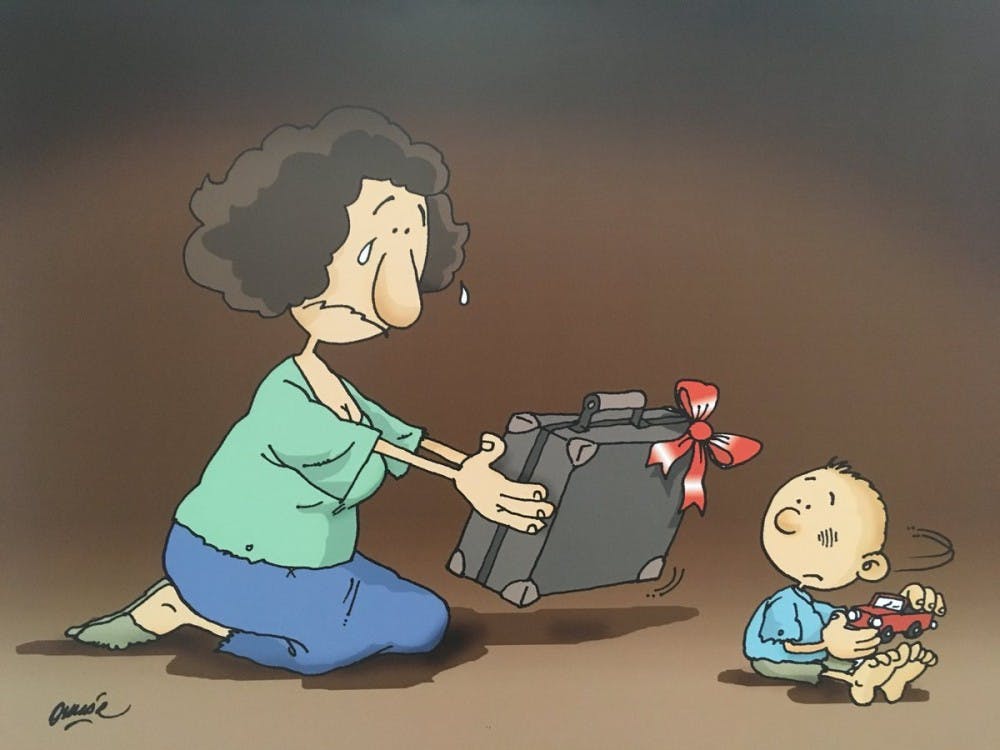The Spanish verb refugiarse is reflexive, which means it is a verb done to oneself — in this case, seeking shelter or refuge for oneself. But “RefugiARTE,” an exhibit on display at the Sanford School of Public Policy’s Rubenstein Hall until Dec. 12, is also reflective, imploring the viewer to examine the current global refugee crisis and its humanitarian implications.
The exhibit, which is presented by the Duke-UNC Rotary Peace Center in collaboration with the United Nations High Commissioner for Refugees, the Duke Center for International Development, the Duke University Center for International and Global Studies and the Sanford School, features 20 editorial cartoons, all created by individual Latin American artists.
In curating the exhibit, “we were looking for not only something that personally touched us, but art that would get people thinking,” said Susan Carroll, managing director of the Duke-UNC Rotary Peace Center. “[We wanted] to portray refugee situations and … the personal trauma that goes along with making the decision to leave your home, [in hopes] that it would really speak to people and make them think.”
The exhibit’s opening coincided with a visit from Filippo Grandi, the current United Nations High Commissioner for Refugees, who gave a talk about the global refugee crisis at UNC’s Memorial Hall Sept. 19. The talk was Grandi’s first visit to an American university.
“It was a unique opportunity to not only have [Grandi] speak… but to raise awareness [through art] as well,” Carroll said. “The refugee crisis is one of the big crises of the world right now, so rather than just having someone give a talk, we were trying to create other opportunities around it. It seems to be promoting a lot of discussion, which is exactly what we would’ve intended.”
The cartoons featured in the exhibit are displayed without explanations from the artists, because they are “really meant to get you thinking,” according to Carroll.
“We didn’t want [pieces] that were necessarily obvious, but also nothing that was so opaque that you couldn’t quite figure out what they were,” Carroll said. “We wanted to make sure there was a variety of ideas and concepts represented.”
Each of the 20 pieces was rendered in the artists’ unique perspective on the refugee crisis. Some took a more satirical, comedic approach, while others communicate a decisively somber tone.
“I think this refugee issue is very serious and it is very painful for [those] who are in this situation,” wrote Jean Galvão, a Brazilian cartoonist whose work is featured in the exhibit, in an e-mail. “So I drew the world with no place for them, as if it had an end. There is no entrance to a better life, there is only an abyss of humanity.”
In his talk at UNC, Grandi called for an increase in humanity with regard to the global refugee crisis. According to Carroll, one of the chief suggestions Grandi offered as a way individuals can aid in the crisis is getting to know refugees and “learning their stories.”
Getting to know a refugee’s situation “can change the way people think,” Carroll said. “Becoming a little more compassionate, realizing that [refugees] are humans who had to make a really horrible decision to keep themselves and their family members safe.”
Members of the Duke community have ample opportunity to get involved in aiding the refugee crisis. Two NGOs that the Duke-UNC Rotary Peace Center works with, Church World Service and World Relief Durham, are a 10-minute drive off-campus. Additionally, the Office of the Provost’s fall forum is centered around “Immigration in a Divided World,” and will host multiple events focusing on the refugee crisis. The “RefugiARTE” exhibit is a featured event in the forum.
“We’re bringing attention to a big, tragic problem, so it’s not like you can look and smile at anything, but I’m grateful to see that people are interested in this, and that they’re seeking it out,” Carroll said. “There’s a lot we can all do, and if [“RefugiARTE”] prompts people to take that more seriously and think about ways that they can have an impact, then that’s all good.”
Correction: This article has been updated to include UNHCR’s sponsorship of “RefugiARTE.” The Chronicle regrets the error.
Get The Chronicle straight to your inbox
Signup for our weekly newsletter. Cancel at any time.

